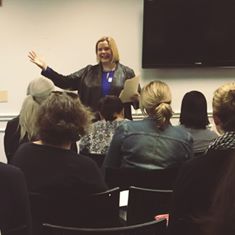In a lively, frank and humorous talk, KUT anchor Jennifer Stayton kept the audience engaged and  informed at the most recent meeting of Freelance Austin, held at Tech Ranch on April 13.
informed at the most recent meeting of Freelance Austin, held at Tech Ranch on April 13.
Her suggestions were useful and practical, whether your interview is for a media article, an on-air broadcast, a marketing video, an in-house newsletter or many other applications.
Here are 12 of her tips:
- Do your homework beforehand. Read up on the person you’re interviewing; if they’re promoting a book or a movie, read the book or see the movie. If it’s for a company, read through articles about that company and recent topics of interest in that industry.
- Make sure you’re interviewing the right person. It might take a few calls, but it will be more rewarding for everyone if you have the correct expert or authority for your topic.
- Do a pre-interview; a quick call where you talk with the person to introduce yourself. You might chat about topics you’ll probably bring up during the interview, or just get to know each other a little better.
- During the actual interview, begin with some warm-up questions that are pretty easy for the person to answer. This helps break the ice and helps the person relax – if you are interviewing someone who is not a public figure, they might be a little nervous. Ask about their kids or pets, or favorite hobbies, for example.
- Have a list of questions ready – but don’t feel like you have to stick to them. “An interview is a dance between prepared questions, improvised questions and surprises that come up during the interview,” Stayton said. “Sometimes the path you planned doesn’t work, but another path will.”
- Put thought and effort into creating your list of questions. Draw upon the research you’ve done, and think about what the reader or viewer would like to know. Stayton paraphrased Krista Tippett, the host of NPR’s “On Being,” who advises, “Ask a beautiful question to get a beautiful answer.” Write open-ended questions, i.e. “How do you feel about that and why?” versus “Do you like that decision?”
- Zip your mouth and listen. Don’t be so focused on moving to the next question that you can’t ask good follow-up questions. This is a conversation and should follow a natural path.
- Remember you are one person representing a lot of people. If your subject just said something and you don’t understand it, don’t be afraid to say “I didn’t understand that last point” and ask them to clarify. Experts in technical or medical fields may use a term that’s not familiar to your readers or viewers.
- Pause to reset and restate what you’ve heard. Later in the interview, pause and say something like, “Let me make sure I’ve been following you correctly to this point” and restate some of the things they have said. It gives you and the subject a breather, and gives both people a chance to go over what has been said so far.
- Don’t be afraid to ask uncomfortable questions. You’re not there to be their best friend, but to get a good interview.
- The final question should always be, “What did I not ask that you’d like to share?” Quite often, this elicits the most interesting response of the interview.
- Always make sure you can get in touch with them later. Most subjects are happy to respond to follow-up questions, or to clarify something they said. Ask for their phone number and email before you go.
Latest posts by Michele Chan Santos (see all)
- The Art of the Interview: April Meeting Recap - April 22, 2016
- The City of Austin’s Resources for Freelancers: October Meeting Recap - October 23, 2015
